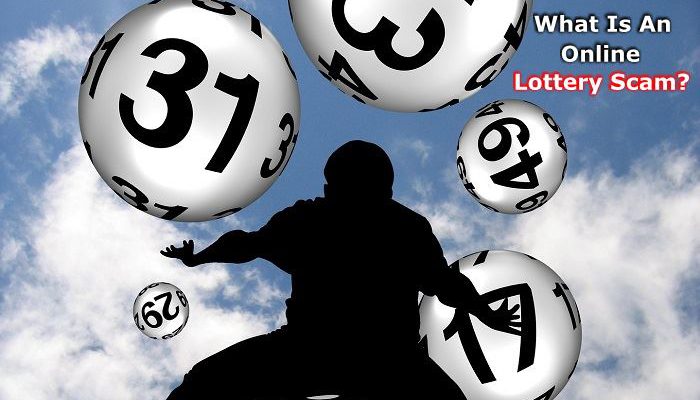In A Hurry? Click Here To Download This Post As A PDF To Read Later
Have you ever received an unsolicited email informing you that you have won prize money in an internet lottery and you have to provide some personal information to claim the win? The problem is that you may not remember ever entering any such lottery.
If you got this type of email in your inbox, you are most likely dealing with online lottery scammers, and you shouldn’t even try to respond to the email or provide any personal details. If you are going to win any online lottery, the chances are, you will remember that you entered such competition vividly.
The Modus Operandi

An online lottery scam begins with a random email in your inbox. You will see an inviting subject stating that you are the winner of a big prize in an international lottery. The best thing you can do is to delete the email without wasting time to open it because having a peek into the content might lure you into their trap.
The first letter was one out of thousands that the fraudsters send out, in the hope that some of the recipients will respond. If you reply, they will bombard you with a series of follow-up emails, and they may even call you to get you hooked on their scheme.
But let’s assume you wanted to check out the content of the email, these are some of the things to look for when you get this type of email:
The Date Of The Lottery
The first thing to check is the date the lottery was played. Did you play an online lottery on the date quoted by the email? If not, then something is not right. Logic dictates that you cannot win in a lottery you didn’t participate in.
Processing Fees
If the letter is asking you to pay any form of money, it may be a processing fee or courier services charges  before you can claim your money, know that you are dealing with a scam. No legitimate lottery company will ask for any processing or handling fee before releasing your wins, they will release the money to you, but you might need to pay some tax on your winnings.
before you can claim your money, know that you are dealing with a scam. No legitimate lottery company will ask for any processing or handling fee before releasing your wins, they will release the money to you, but you might need to pay some tax on your winnings.
Disproportionate Prize
Even if you played a lottery, were you expecting a win running into millions of dollars? But the letter informs you of winning a prize of more than five million dollars. Surely, you know there is nothing free in the real sense of the word.
Is Anything Out Of Place?
Many of these scams originate from foreign countries where the perpetrator don’t speak English as their first language. Is the language grammatically correct? Is the message referring to a foreign currency whereas it claims you played the lottery in the UK? These discrepancies are telltale signs of an online scam. Back off as fast as you can.
Personal Information
Internet lottery scammers will often ask you to provide personal information and details of your bank and driver’s license. They will claim it is meant to process the transfer of your money to you, but this is a ploy to gain access to your finances and identity. Never give out any personal information, sensitive or insensitive to anyone.
Is The Tone Of The Letter Trying To Pressure You?
Most lottery wins usually have extended expiry dates, but here is a letter pressuring you to claim your prize as soon as possible without any explanation. This should tell you the prize is illegitimate.
Don’t Tell Anyone
Why would a lottery company warn you not to tell anyone about winning a considerable amount of money that could change your life? This is a desperate tactic used by scammers to frighten their victims so that their nefarious activities will not be exposed and reported to security agents.
Usually, they will tell you to contact an official handling your case, but that you must keep everything confidential for security reasons. No law-abiding company will ask you to keep your winning to yourself. What’s the justification?
Check The Email Address
Take some time to scrutinize the email address. Do you think it belongs to a genuine company? If the email address comes from a personal Gmail or Yahoo mail account, then it is probably not from a legitimate lottery.
Types Of Lottery Scams
There are many types of lottery scams, but here are some of the famous types:
The Advance Fee Lottery Scam
In this kind of lottery scam, you will receive a message about a lottery you won, but you don’t remember ever playing the lottery in question. Then the scammer asks you to pay a certain amount of money so that they can help you process your win. You may think this sounds funny, but thousands of people fall victim to this type of lottery scam, and it persists to this day all over the world. Be on the lookout and be wary of any fictitious email congratulating you on a lottery you didn’t enter.
An Unfamiliar Lottery
So you play lotteries, but you can’t place the name of the lottery. This variation of the advance fee lottery scam tries to make the lottery authentic by claiming it was sponsored by huge corporations that everybody knows about. They claim that the lottery automatically selected your email address or social media profile, and luckily you emerged a winner!
Lottery Winner
This type of lottery scam doesn’t claim you won a prize. Instead, a recent winner of a huge jackpot whose name made waves all over the place is trying to give back to the society, and you happen to be among the people he wants to give some of his winnings. This scam can be hard to unravel because there are people who have won jackpots in the past who went ahead to establish trust funds to help members of the public.
How To Avoid Internet Lottery Scams
Here are some tips to help you avoid internet lottery scams:
Did You Participate?

It’s not possible to win in a lottery which you didn’t participate in.
The scammers will try to persuade you to believe that your name was picked randomly or that it was played on your behalf.
Don’t fall for this, its total hogwash. Always have this in mind whenever you receive this types of email or calls.
Never Send Your Details
They ask for your bank details and other sensitive information, claiming they need it to facilitate the payment of your win. If you do this, you have fallen into their trap because they now have everything to wipe you clean and clone your identity in the future.
Don’t Pay Dime
No legitimate lottery will demand any form of payment before processing your prize. The next thing you should do when you see the letter asking for payment is to hit the delete button.
Make Your Claim Directly

Let’s assume you really played a lottery, and now you get this suspicious email in your inbox. Fish out your original lottery ticket and compare the details with the copy sent with the email. That way, you know if the claim is true or fake.
Again, if it’s too good to be true, it probably is. Never let the thoughts of an amazing life you could live with the promised win lure you into an online lottery scam. Most of the scams are usually easy to identify, as they usually have something odd standing out. Be alert, and don’t respond to any emails promising great gains where you never expected anything. It could look promising, but it could also cost you in the long run.
I hope you enjoyed this post and if you have any questions about lottery scams or you just want to leave your own personal experience, leave a comment below. I would love to hear from you!








Hi Moni, Great post. I receive emails daily claiming I have “won” or I am about to win. I am sure at some point I put my email address in somewhere and here I am today, deleting email after email….throwing away millions.
Great tips for determining the legitimacy of a lottery email.
Hi Patricia.. thank you for dropping by and taking the time to comment…I appreciate your kind words..
Like you I am also “throwing away” my millions by deleting the emails 🙂
In all seriousness this is the BEST thing anyone can when you get an email like this.. just delete it!
Hi, great article and superb advises for people who experiences scaming in the lottery. I will share it with others so that everyone can benefits from it. Great article and good job…keep it up..
Hi Sarah… thank you for dropping by and taking the time to comment.
I appreciate your kind words and share this artice with everyone you know so we can stop more people falling victims to these scammers.